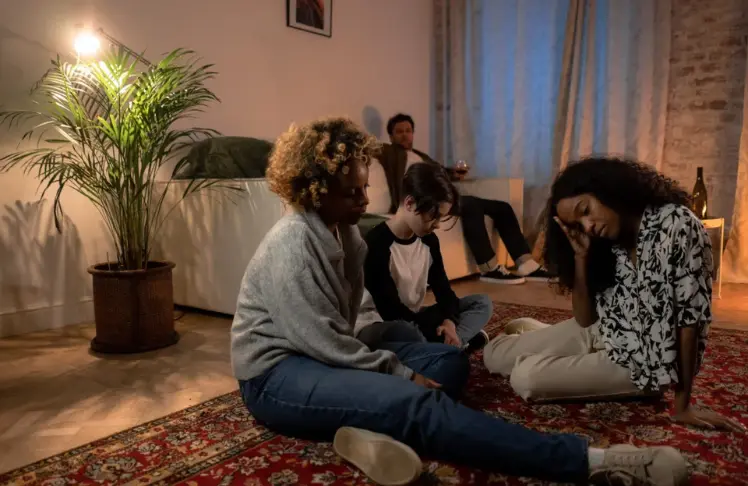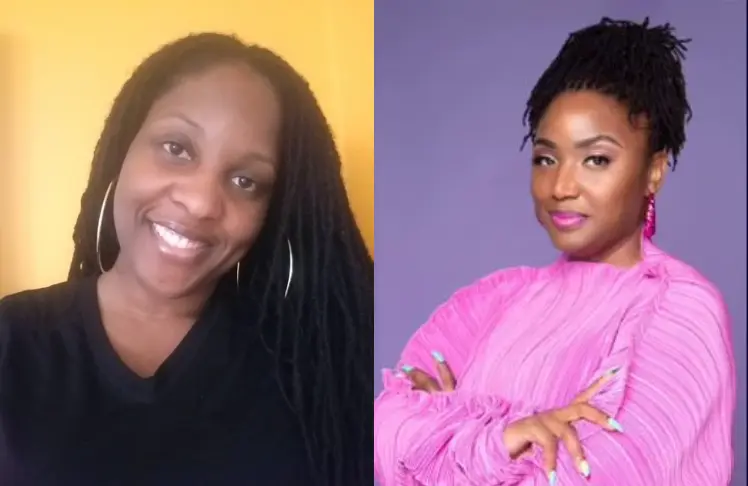
This story is part of “Love Don’t Live Here” Word In Black’s series about how domestic violence impacts our community and what we can do about it. Trigger Warning: These stories contain mention of domestic violence and abuse.
Domestic violence greatly impacts Black adults, but the harm doesn’t stop with them. Children who live with parents or caregivers in an abusive relationship are also at risk for mental and physical injury due to their exposure to violence.
In the United States, as many as 10 million children between the ages of three and 17 witness violence in their homes each year, according to researchers. Some kids may see or hear the violence. Others may feel the emotional trauma or be used as a pawn by an abusive caregiver.
LaTrice L. Dowtin, a trauma therapist and founder of PlayfulLeigh Psyched, a Bethesda, Maryland-based center for social and emotional wellness, says any exposure can have short- and long-term consequences.
“Children who witness, overhear, and hear about intimate partner violence can develop symptoms of acute stress disorder and even posttraumatic stress disorder,” Dowtin says.
In the immediate aftermath, Dowtin says, children may experience symptoms such as difficulty paying attention, challenges sleeping peacefully or solidly throughout the night, and noticeable changes in their appetite.
These symptoms are commonly misdiagnosed as attention deficit hyperactivity disorder (ADHD), she says.

“Really young children, such as from birth through 5-years-old, may experience an increase in tantrums, become more clingy toward the non-offending caregiver or with whom the child has a good bond,” Dowtin says.
The trauma may also cause physical ailments, such as bedwetting and body pains.
Caarne White, a therapist and pastoral counselor, saw this first-hand in her previous role as a school counselor.
“If somebody’s hitting someone [at home] or is verbally abusive, [the kids] would come to the office with a stomach problem,” she says. “And if they had eaten, if they had slept, if all of the things were normal, then the nurse would bring them to me and say, ‘I think there could be more there.’”
Generations of Relationship Problems
Over time, interpersonal problems may follow bodily pain. School-aged witnesses are less likely to have many friends and participate in outside activities, while adolescents have higher rates of parent-child conflict.
Dr. Sky Lea Ross, a marriage and family therapist, says relationship issues arise when the nervous system has been dysregulated.
“Trauma causes the central nervous system to get stuck in fight or flight mode, so even when there isn’t a present danger or stressor, stress hormones are still firing off, causing the body to react as if there’s a threat even when there’s not,” she says. “This can make relationships difficult, as the individual may not feel safe even when they are.”
Youth raised in violent households are also more likely to develop low self-esteem.

Latrice Whitehead, a licensed clinical social worker, says this can cause people-pleasing behavior in relationships.
“Sometimes they’re not able to validate themselves, so they seek validation from other people in the form of those people-pleasing behaviors: Trying to get along with everybody, [being someone] who wants to make everybody happy,” Whitehead says. “And sometimes it’s at the detriment of themselves.”
Preventing Future Violence
Children who witness violence may be at greater risk of experiencing violence in future intimate-partner relationships. However, this is not always the case. Accessing proper care may change that outcome.
“Children receiving therapy early can break the cycle,” Ross says. “Or children having access to at least one healthy adult can help them form healthy attachments.”
Whitehead says loved ones and community members can help child witnesses heal by acknowledging their positive achievements.
“[When] somebody’s blaming themselves, or they have a negative self-view, they think pretty poorly of themselves at times,” she says. “It’s helpful for people to recognize their strengths and talk about that and to affirm when they do something well.”
White says creating safe environments where personal safety can be discussed is “just as important [for children] as it is to adults.”
“It’s sometimes even more important to children because, unlike adults, they don’t know what choices they have until you tell them,” she says.
Dowtin agrees that moving the child to a safe environment is the priority. Next, based on the child’s age, she recommends a variety of therapy sessions with and without the parent.
Throughout her counseling work with families, she said she’s seen improvements in school, emotional regulation, increased involvement in social relationships, and parents who were able to regain their child’s trust.
“Black people have enough historical and generational trauma to heal from without having to add additional layers,” she says. “But, appropriate and timely trauma intervention can help the brain heal and prevent future unwanted reactions to benign situations.”
If you or someone you know is being affected by intimate partner violence, please consider making an anonymous, confidential call to the National Domestic Violence Hotline at 1-800-799-SAFE (7233). Chat at http://thehotline.org | Text “START” to 88788. There are people waiting to help you heal 24/7/365.















